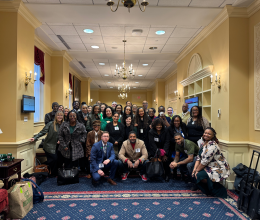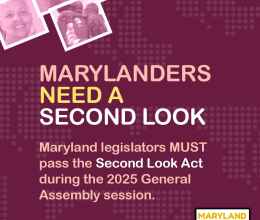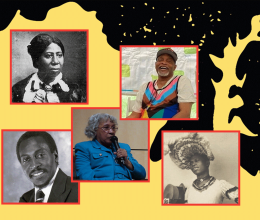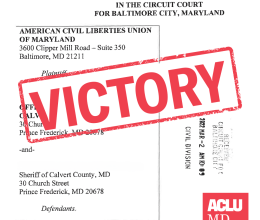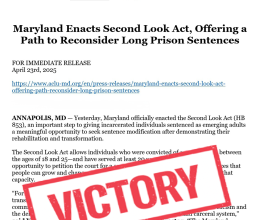
The holiday season is in full swing! But as you know, advocating for civil rights is a year-long job. Not only do we want to celebrate the many cultural and religious holidays that occur worldwide during these winter months, but we also want to celebrate some civil liberties moments that occurred during past holiday seasons. We like to think of these civil liberties victories as gifts and these civil rights fights as moments in time that inspire celebration and reflection.
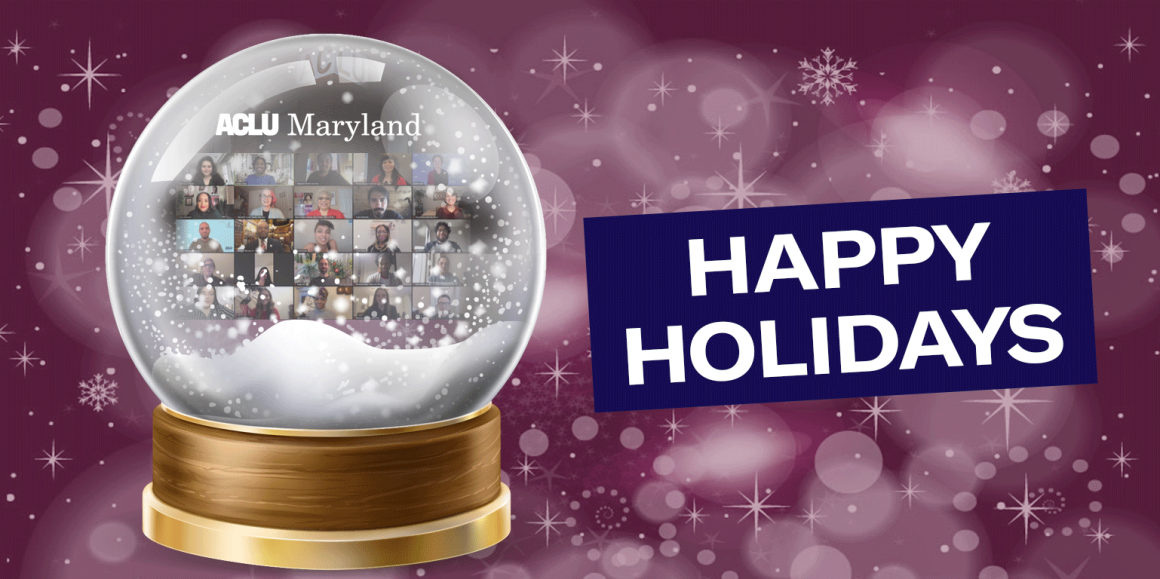
Happy Human Rights Day!
December 10
Did you know? Human Rights Day is celebrated across the globe and commemorates the United Nations General Assembly’s adoption of the Universal Declaration of Human Rights in 1948.
On December 2, 2011, we filed an amicus brief in the U.S. Supreme Court successfully defending the 2010 civil rights law that Maryland activists – including an organized group from Somerset County on the Eastern Shore – had worked hard to pass, “the No Representation Without Population Act.”
This law, which became a model for others around the nation, requires that the State of Maryland count people who are incarcerated at their home addresses, instead of the prison where they are detained. Given systemic racist policing and the disproportionate rates at which Black people are incarcerated and the continuing denial of voting rights to most people in prison, this law prevents the dilution of the power of Black people’s vote.
Deborah Jeon, Legal Director for the ACLU of Maryland, said at the time: "It is unconscionable to bring back the old system of using disenfranchised – and disproportionately African-American – prison populations to pad white electoral districts."
The victory in this case ensures that Black people who are blocked from voting and who are from other communities are no longer counted in white districts. It also makes clear that people who are incarcerated will always be a part of their home/community, which most people will be returning to.
“Hanukkah Sameach!” (Happy Hanukkah)
December 10 to December 18
Did you know? Hanukkah is a Jewish holiday, which celebrates the rededication of the Second Temple. In the second century BCE, a small group of Jewish rebels, known as the Maccabees, fought back against Greek oppressors who wouldn’t allow Jewish people to follow their faith. After the victory, the oil they lit in the Second Temple miraculously lasted for 8 days. This is also the reason why Jewish people eat foods fried in oil during Hanukkah, as a reminder of this miracle.
In December of 2014, the national ACLU and the New York Civil Liberties Union reached a settlement with the United Parcel Service right before the U.S. Supreme Court was set to hear an argument in an important pregnancy discrimination case from Maryland.
The employer offered light-duty accommodations to employees who were injured on the job or disabled employees, but did not offer the same accommodations to employees who were pregnant. This policy undermined the Pregnancy Discrimination Act, which prohibits employers from denying pregnant workers light-duty accommodations that are available to other employees.
"Workers should not have to choose between their jobs and a healthy pregnancy," said Julie Desantis-Mayer, a female driver for Farmingville UPS facility in Long Island, N.Y. who said that she was forced onto unpaid leave and lost her health insurance, just before the birth of her baby.
The Supreme Court later went on to rule, in the Maryland case, Peggy Young v. UPS, that people who are pregnant must be treated fairly and given accommodations that are necessary for their health, ingraining in the law the changes in policy agreed to by UPS in the New York settlement.
Happy Winter Solstice!
December 21
Did you know? The Winter Solstice marks the sun’s rebirth, on the longest night of the year. Cultures around the world celebrate this day in different ways. For example, Dong Zhi is a Chinese celebration of this holiday that welcomes positive energy.
In December of 2015, Baltimore homeowner Maurice Whitehurst successfully defended his right to free speech against the Baltimore City Department of Housing and Community Development. When Maurice was ordered to remove a “Black Lives Matter” message from his side of the property, Maurice did not back down, determined to exercise his constitutional right. With the help of the ACLU of Maryland, Whitehurst wrote a letter to the Baltimore Housing Authority, declaring that he could not be in violation of any law because the writing was on his own property.
“Sharing these messages on my wall is both my right and my opportunity to make sure all sides to the story of turmoil in Baltimore are heard,” said Maurice Whitehurst.
The First Amendment rights of Black, Indigenous, and people of color are often trampled upon in this country. This victory reinforced that the right to freedom of speech belongs to Black, Indigenous, and people of color too.
Merry Christmas!
December 25
Did you know? Christmas is a Christian holiday that celebrates the birth of Jesus Christ, who Christians recognize as the Messiah and the Savior of the world. One symbol that is hung during Christmas is the wreath, which is a circular evergreen branch that in Christmas tradition represents the thorns Christ wore on the cross on which he died and symbolizes eternal life and love.
On December of 2018, thirteen Black and Brown officers challenged their own police department, going up against a system deeply entrenched in white supremacy. These 13 Prince George’s Police Department officers, along with the Hispanic National Law Enforcement Association and the United Black Police Officers Association, filed a lawsuit in federal court that challenged PGPD’s culture of racism and retaliation.
Michael Graham, a former senior officer with the Los Angeles County Sheriff’s Office and nationally recognized as a police practices expert, wrote an extensive report detailing what Black and Brown officers have been pointing out for years. Graham reported over two dozen instances where white PGPD officers engaged in racist conduct and received little to no discipline and described five instances where the department received grievances from civic leaders about the racist behavior of white officers and did nothing to discipline those officers.
“I took an oath to serve my community not to be part of the police department in wrongdoing,” said Sonya Lancaster, one of the plaintiffs.
By standing up to entrenched racism behind the badge, the plaintiffs in this case seek to hold police officers – and themselves – accountable to the public trust placed in them. More and more, cases like this one are challenging white supremacy within police departments and will begin to make changes in the racist culture of policing.
Furaha ya Kwanzaa! (Happy Kwanzaa)
December 26 to January 1
Did you know? Dr. Maulana Karenga created Kwanzaa, a Pan-African holiday, in 1966 at the height of the Black power and Black nationalist movements. He combined elements of Ashanti and Zulu traditions to form the basis of Kwanzaa, which celebrates African heritage, unity, and culture. Kwanzaa comes from the Swahili phrase: “matunda ya kwanza,” which means “first fruits of the harvest,” which were celebrated by Africans during ancient times.
On December of 2019, a federal court ruled that it was unlawful for the Trump administration to use emergency powers to divert $3.6 billion in funds to build a border wall. Congress had already explicitly denied the Trump administration’s demand for the funds. The Sierra Club, Southern Border Communities Coalition, and the national ACLU were able to successfully challenge this abuse of emergency powers.
“This ruling confirms that the president has no authority to raid military construction funds for his xenophobic wall,” said Dror Ladin, staff attorney with the ACLU’s National Security Project. “By putting an end to the president’s power grab, this ruling protects our democracy’s separation of powers, the environment, and border communities.”
This victory solidifies the stance that all immigrants are welcome here. America’s immigration policies are often both racist and xenophobic. But through dedication and hard work, we can begin to change this systemic racism.
Happy New Year!
January 1
Did you know? Many cultures celebrate the new year with different customs. For example, in Lagos, Nigeria, people attend parties and concerts and listen to live music. People in Ecuador make scarecrows that look like people or figures they dislike then burn them at midnight as a way of cleansing the bad energy of the year.
On January 7, 1994, a monumental victory was achieved in Worcester County that resulted in the election of the first ever Black county commissioner there in 250 years. A federal judge in Maryland struck down as racially discriminatory the at-large election system used for County Commission offices in Worcester County on the Eastern Shore, finding them in violation of the federal Voting Rights Act.
In its New Year ruling, the Court ordered the County to come forward with a new, racially equitable election system within 60 days. The County refused for two years, but all of their challenges ultimately failed. And on November 5, 1995, activists across the Lower Shore celebrated as one of the named plaintiffs, James L. Purnell, made history as Worcester County’s first-ever Black Commissioner.
“This is the greatest night of my life,” lead plaintiff Honiss Cane declared as he congratulated Purnell. “It’s been a long time coming,” another celebrant declared. James Purnell would go on to serve as the Commission’s President, and following his retirement, be succeeded by Diana Purnell, the County’s first Black woman Commissioner, who continues in office today.
Activists showed their dedication and hard work to move forward and change voting systems, policies, and procedures that do not carry on the legacy of diluting the political power of Black people.
El Día de los Reyes (Three Kings Day)
January 6
Did you know? Many people in Latin American countries celebrate this Christian holiday, which marks gifts given by the “three wise men” or the “three kings” to baby Jesus Christ because they recognized he would be king one day. This day is celebrated as a way of honoring the three kings and ending Christmas festivities. People also exchange gifts on this day.
On January 24, 2013, Maryland’s highest court ordered the Maryland State Police to turn over records about racial profiling complaints under the state’s public information law. In 2007, the ACLU of Maryland and the Maryland State Conference of NAACP Branches charged that MSP improperly withheld documents that would show whether it had meaningfully investigated profiling complaints.
Robert Wilkins – now a federal appeals court judge – led the charge when he, in 1993, was one of the first Americans to legally challenge what became known as “driving while Black.” Wilkins, a Black public defender traveling with his family after attending a funeral out of state, was illegally stopped, detained, and searched by white state troopers. The documents revealed by this case showed that the MSP had a practice and pattern of illegally targeting, stopping, and searching Black drivers.
"This ruling sends a strong message to government officials, particularly law enforcement, that transparency and accountability is vital to a healthy relationship with the communities they serve," said Gerald Stansbury, then-President of the Maryland State Conference of NAACP Branches.
The police cannot continue racially profiling Black people with no accountability. This case is one example among many of the systemic racism within our police departments. We need to shed light on more cases in order to reimagine policing.
Happy MLK Day (Martin Luther King Jr. Day)
January 15
Did you know? Martin Luther King Jr.’s birthday is a federal holiday. It is seen as a day to not only reflect on the brilliant activism work Martin Luther King Jr. has done, but also a day to promote racial justice work.
In January of 2016, former Pocomoke City Police Chief Kelvin Sewell, detective Franklin Savage, and officer Lynell Green challenged local white officials for race discrimination and retaliation, including the firing of the town’s first Black police chief. The Black officers were forced to endure repeated racial slurs by white police officers and discussion of lynchings and the Ku Klux Klan in their presence during work hours. Despite this intimidation, the officers still advocated for justice and accountability and against white supremacy.
“I’m exposing those who think they can get away with things like this,” said former Pocomoke City detective Franklin Savage.
Four years later, in 2020, the Pocomoke case reached a victorious conclusion, when the officers were awarded $1.7 million in damages and costs, and the law enforcement agencies involved entered into a court-monitored Consent Decree reforming their policies and practices.
Through their courageous stand, these three Black officers sent a message to police departments across Maryland that white supremacy must be stopped within our police departments. As we witnessed this past summer, with the massive protests following the police killings of George Floyd and Breonna Taylor, our community will make its voice heard and demand change from our legal justice system.
बोधि दिवस (Bodhi Day)
January 20
Did you know? Bodhi Day is quiet Buddhist holiday that is recognized through reflection. It celebrates Siddhartha Gautama, “the Buddha,” the founder of the Buddhist faith, who experienced enlightenment or an awakening through meditation on this day. Some people even eat a bowl of milk and rice, which Buddha ate after reaching enlightenment or an awakening, which means learning the truth about life.
On January 21, 2020, the Circuit Court for Baltimore City forcefully rejected the State of Maryland’s attempt to dismiss the landmark education equity case, Bradford v. Maryland State Board of Education. Baltimore families brought this lawsuit to demand that the state abide by its constitutional duty to give children in Baltimore City an adequate education.
This significant victory brought hope that children in Baltimore will one day attend schools with equitable resources, quality instruction, drinkable water, functioning heating and cooling systems, enough teachers, enough afterschool programs, adequate lighting and ventilation, and proper fire alarm systems.
“We must invest in our future leaders, which is our children today!” said Angela Gant, mother of two children currently in Baltimore City Public Schools.
It has been too many decades that the State has failed to give children in Baltimore the resources necessary to ensure an adequate education. With this historic lawsuit, families in Baltimore aim to make their children’s dreams a reality.
